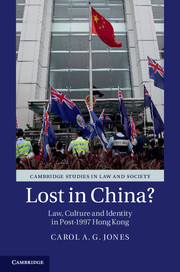
-
Select format
-
- Publisher:
- Cambridge University Press
- Publication date:
- 05 May 2015
- 30 April 2015
- ISBN:
- 9781316144916
- 9781107093379
- Dimensions:
- (228 x 152 mm)
- Weight & Pages:
- 0.55kg, 284 Pages
- Dimensions:
- Weight & Pages:
You may already have access via personal or institutional login
Book description
Rule of law is a core Hong Kong value, providing a defensive wall around the territory and protecting its way of life against 'mainlandisation'. Before the 1997 retrocession to China, fears were widespread that the rights and freedoms enjoyed under colonial rule would be eroded, that the rule of law would be weakened and that corruption would increase. Soon, the first blows were struck against the rule of law via an NPCSC ruling which overturned the judgment of the Court of Final Appeal. Successive interventions by Beijing in Hong Kong's legal and political affairs have given rise to fears about the loss of the rule of law and loss of identity. These fears have subsequently provoked mass street demonstrations, including the 'Umbrella Revolution' of 2014. But, as this book shows, Hong Kongers also use less explicit arts of resistance to maintain their identity.
Contents
Metrics
Altmetric attention score
Full text views
Full text views help Loading metrics...
Loading metrics...
* Views captured on Cambridge Core between #date#. This data will be updated every 24 hours.
Usage data cannot currently be displayed.
Accessibility standard: Unknown
Why this information is here
This section outlines the accessibility features of this content - including support for screen readers, full keyboard navigation and high-contrast display options. This may not be relevant for you.
Accessibility Information
Accessibility compliance for the PDF of this book is currently unknown and may be updated in the future.


